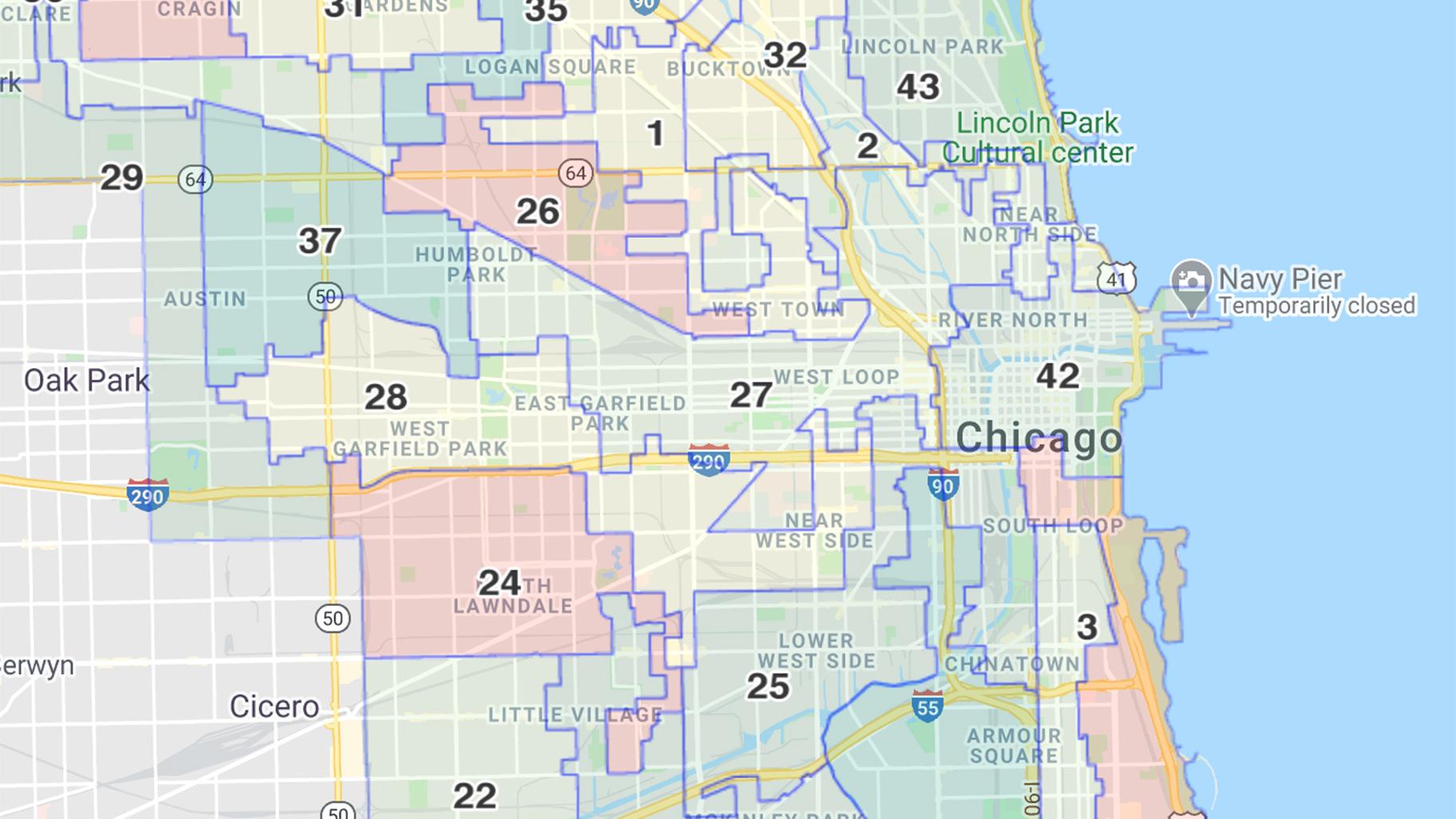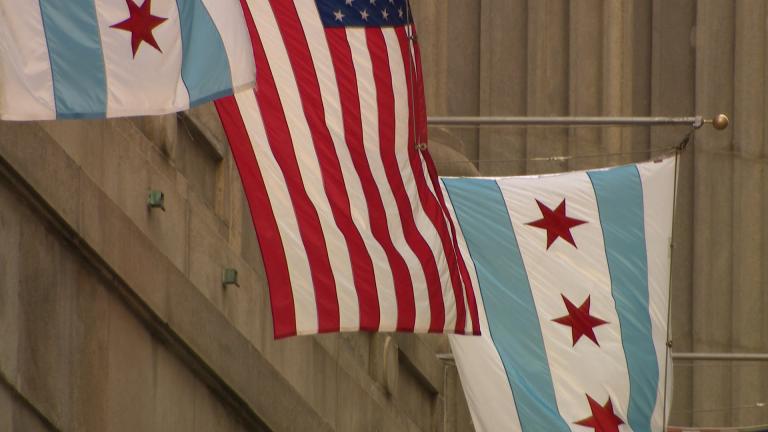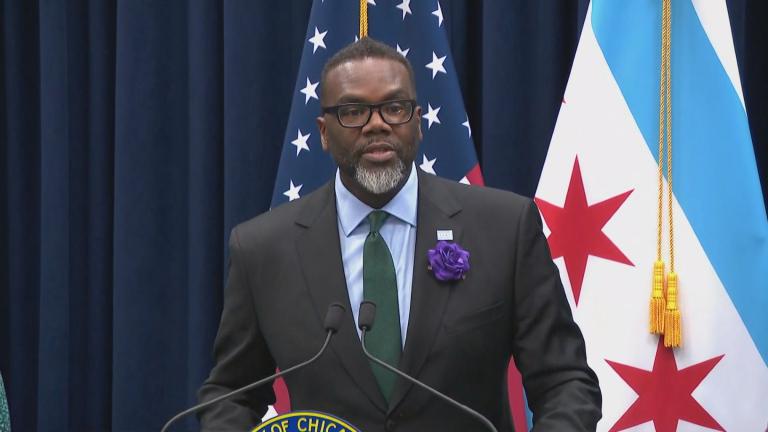It won’t be smoke-filled, but members of the Chicago City Council will head to a backroom at City Hall on July 26 to start crafting new ward boundaries that could shape Chicago politics for the next decade.
In order to use computers loaded with specialized mapmaking software, alderpeople will crowd into the so-called map room to craft the boundaries for each of Chicago’s 50 wards in much the same way they did in 2011 — finally rejecting calls, echoed by then-candidate Lori Lightfoot, to empower an independent commission to craft the maps and put an end to handshake deals between political rivals.
In January, Lightfoot called the process by which maps were drawn in 2011 “a relic of the past.”
“If you look at the ward boundaries, they don’t make any sense and they don’t respect neighborhood boundaries,” Lightfoot said nearly six months ago. “Aldermen have a very specific role to play, and they should, but this can’t be a backroom, closed-door deal that the public has no insights into.”
The final ward maps will have the power to make or break the careers of individual politicians, and either ease — or exacerbate — the roiling tension between the Chicago City Council and Lightfoot, who has passed major policy initiatives on the slimmest of margins and suffered her first City Council defeat last month.
Lightfoot’s spokesperson did not respond Monday to a request for comment from WTTW News about the start of the ward remapping, or why she did not push for an independent commission as she promised during her successful 2019 campaign for mayor. Since taking office, Lightfoot has declined to endorse plans to craft an independent commission.
The new map would take effect in time for the 2023 municipal elections — assuming it is not blocked by a judge.
Even as the mapmaking begins, alderpeople will have to wait until Aug. 16 for data from the 2020 census to be released to city officials. That crucial data has been delayed for months by the COVID-19 pandemic as well as legal challenges brought by former President Donald Trump.
 A new Chicago ward map will take effect in time for the 2023 municipal elections — assuming it is not blocked by a judge. (WTTW News via Google Maps)
A new Chicago ward map will take effect in time for the 2023 municipal elections — assuming it is not blocked by a judge. (WTTW News via Google Maps)
While Gov. J.B. Pritzker signed into law new maps of districts for the state legislature, Illinois Supreme Court and Cook County Board of Review in June that were designed to cement Democratic control of the General Assembly, partisan advantage is not at the center of the debate over new Chicago ward maps.
Instead, the fight — which the City Council’s Latino Caucus signaled Monday would be contentious — will center on race, and the delicate balance of political power in a city with a population that is approximately one-third Black, one-third Latino and one-third white.
Neither the City Council’s Latino Caucus nor the Black Caucus endorsed calls to empower an independent commission to draw the maps, saying alderpeople were best equipped to make sure the maps are equitable.
“Chicago’s Latino population is strong, despite what we know is significant undercounting, and it’s important that our communities have the power to change the political structures that have long worked to disenfranchise communities of color,” said Ald. Roberto Maldonado (26th Ward), the chair of the Latino Caucus’ redistricting subcommittee.
Maldonado and other Latino members of the City Council have said the 2011 remap did not accurately reflect Chicago’s Latino population and vowed in January not to “get played again.”
The Latino Caucus has 13 members, and there are 13 wards where Latinos make up a majority of residents. Ald. Raymond Lopez (15th Ward) left the caucus in 2019.
At the same time, Ald. Jason Ervin (28th Ward), the chair of the 20-member Black Caucus, has vowed to maintain the 18 majority Black wards represented by Black alderpeople.
The remapping effort will be led by 8th Ward Ald. Michelle Harris, the chair of the City Council’s Rules Committee and Lightfoot’s floor leader.
Harris faces a tough task in finding 41 votes for a map that groups approximately 54,000 residents into each ward that can pass muster with courts charged with ensuring Black and Latino Chicagoans can exercise their political power.
State law requires Chicago wards to be “nearly equal as practicable” while being as “contiguous” and “compact” as possible.
Harris did not respond to a request for comment from WTTW News about the remapping effort, which is the first she will oversee. In 2011, former Ald. Dick Mell (33rd Ward) led the process — aided by the now-indicted Ald. Ed Burke (14th Ward), who has seen his clout wane at City Hall as his legal woes mounted.
In 2011, members of the City Council’s Reform Caucus vowed to offer an alternative map but fell just short of blocking the map drawn by Mell and backed by former Mayor Rahm Emanuel.
In 2021, an alternative map could come from the 13-member Chicago Ward Advisory Redistricting Commission. Created by a coalition of community groups lead by Change Illinois, the commission has promised to draw a ward map “that is truly reflective of the diversity of Chicago.”
The decision by Harris to open the map room in two weeks — before census data is available and sooner than many alderpeople expected — will not change the commission’s timeline or effect members’ work, said Chaundra Van Dyk, project manager for Change Illinois.
The commission is determined to convince 10 aldermen to give up their power to draw the ward map and potentially consolidate their power and punish their enemies.
If the map crafted by Harris fails to get 41 votes, it would force a referendum that would put the competing maps up to a vote, officials said. The deadline to trigger a special election on ward maps is Dec. 1.
An effort led by the Harris and Ervin to change the threshold needed to approve the maps from 41 votes to 34 votes, or a two-thirds majority vote, fell short during the final days of the General Assembly.
Contact Heather Cherone: @HeatherCherone | (773) 569-1863 | [email protected]








